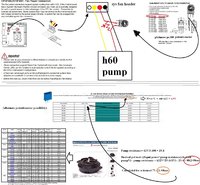I recently downsized to a itx system & lost my physical fan controller. Speedfan/HWInfo allow for PWM control on this board's CPU fan header, but no control via SYS fan header. My H60 pump was running at full speed & a bit loud, so I looked into options. I chose a 300 ohm potentiometer I found on the shelf, wired in series +12V as a variable resistor. Proof of concept works, but the range of adjustment is very small. I can make +/- 500 RPM increments, which is adequate (full adjustment range is ~4500RPM), but can I do better with a different sized/style pot? I really like the PCB style, I'd like to leave it as small as possible. I don't mind sourcing online etc.
 http://imgur.com/a/nP38x
http://imgur.com/a/nP38x
Also, is there any evidence to suggest this is unsafe? I'm not clear about wattage ratings of potentiometers & matching max wattage vs. observed. So long as it doesn't burn down the house or damage critical components; I'm not going to shed tears over the pump itself.
I couldn't find specs for the H60, but when I got home I plugged in some numbers for the similar looking Alphacool DC-LT. I found something that might be better suited(?) 50 Ohm, and 100 Ohm, both are linear & rated to 5W/500V. I don't fully understand the ratings, but the PCB style design seems plenty capable of transmitting 0.5A(?)
Thanks for clearing anything up. ITX has been an awesome case to build, cable management is so simple when you can flip your case upside down & reach all the nooks & crannies. I got lucky with Speedfan & can set up a profile for the radiator fans once I get PWM fans. I think I can set up an alert to monitor minimum pump speed as well. I'm still looking for a way to manually shut down the auxillary HDD, now it's the loudest component in the system. The next time I downsize I'm going for the NCase, it looks amazing.

Also, is there any evidence to suggest this is unsafe? I'm not clear about wattage ratings of potentiometers & matching max wattage vs. observed. So long as it doesn't burn down the house or damage critical components; I'm not going to shed tears over the pump itself.
I couldn't find specs for the H60, but when I got home I plugged in some numbers for the similar looking Alphacool DC-LT. I found something that might be better suited(?) 50 Ohm, and 100 Ohm, both are linear & rated to 5W/500V. I don't fully understand the ratings, but the PCB style design seems plenty capable of transmitting 0.5A(?)
Thanks for clearing anything up. ITX has been an awesome case to build, cable management is so simple when you can flip your case upside down & reach all the nooks & crannies. I got lucky with Speedfan & can set up a profile for the radiator fans once I get PWM fans. I think I can set up an alert to monitor minimum pump speed as well. I'm still looking for a way to manually shut down the auxillary HDD, now it's the loudest component in the system. The next time I downsize I'm going for the NCase, it looks amazing.
Attachments
Last edited:
![[H]ard|Forum](/styles/hardforum/xenforo/logo_dark.png)
